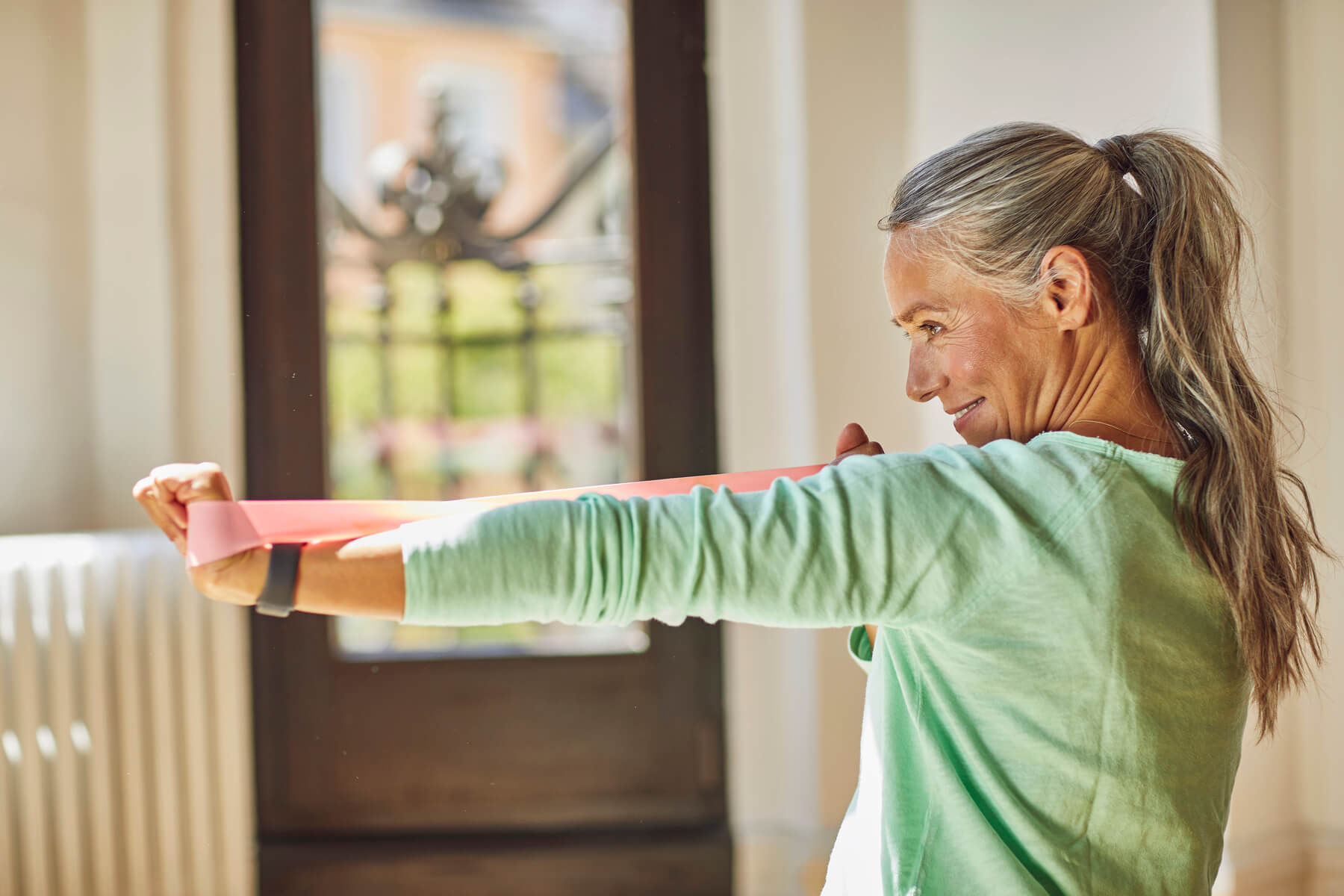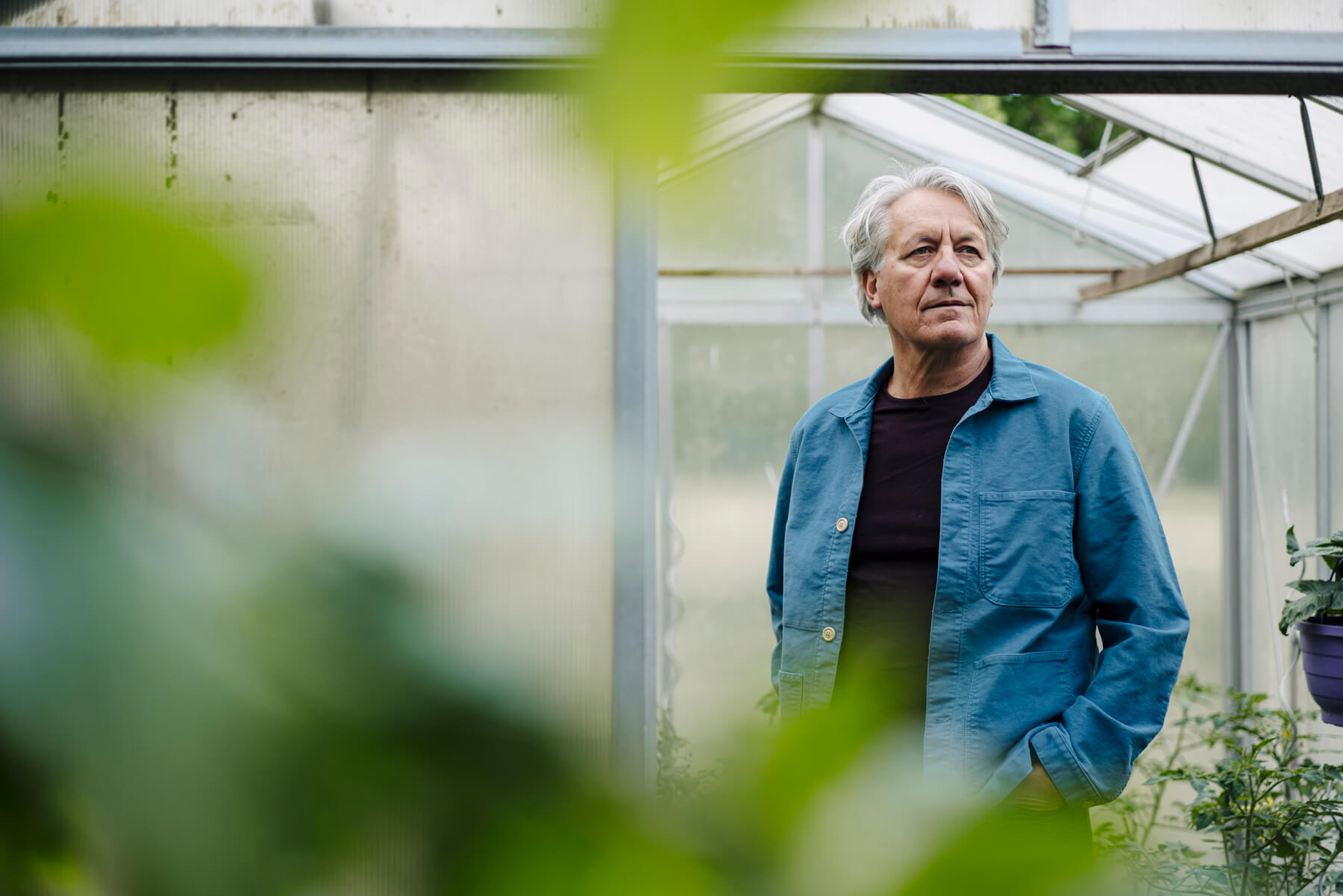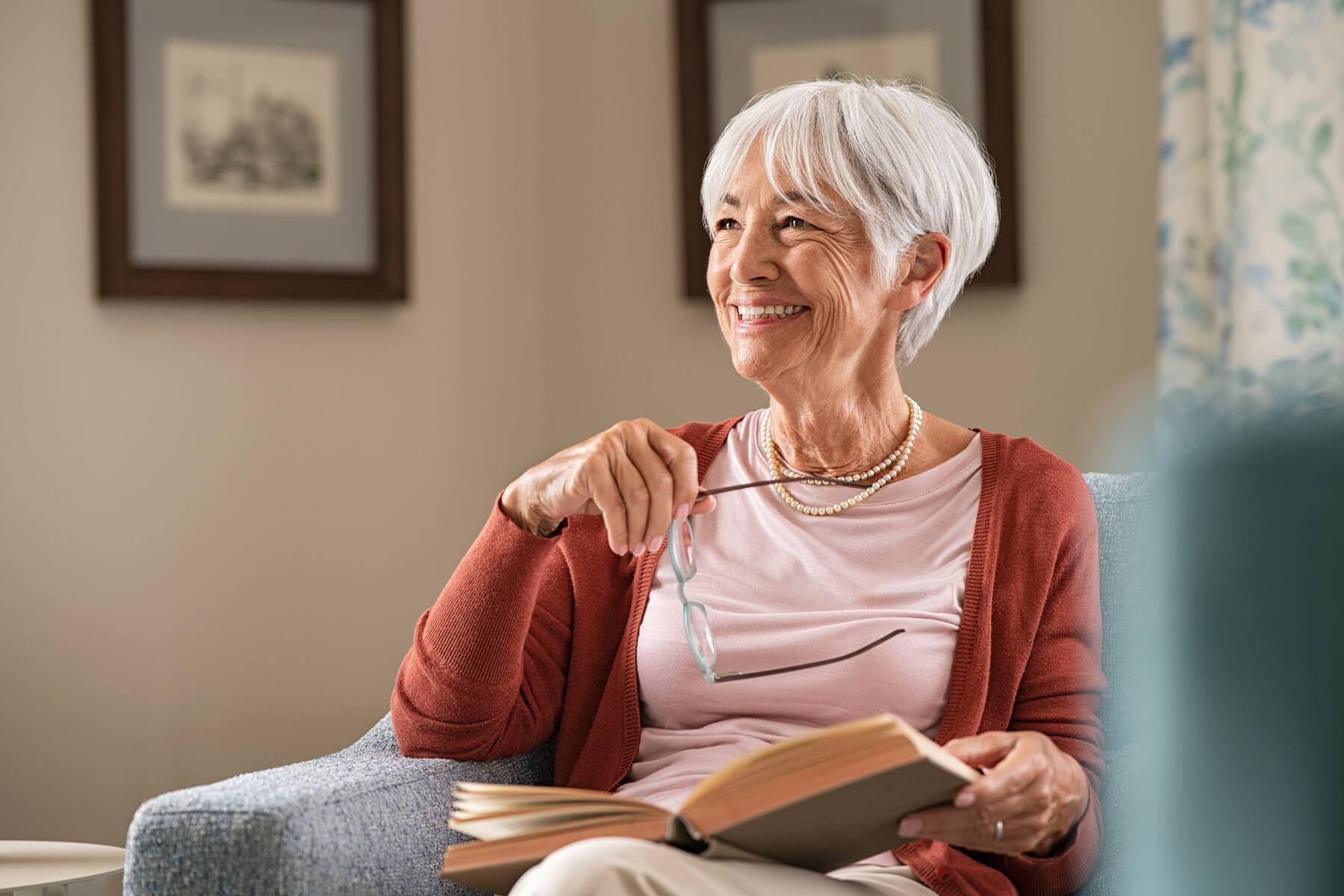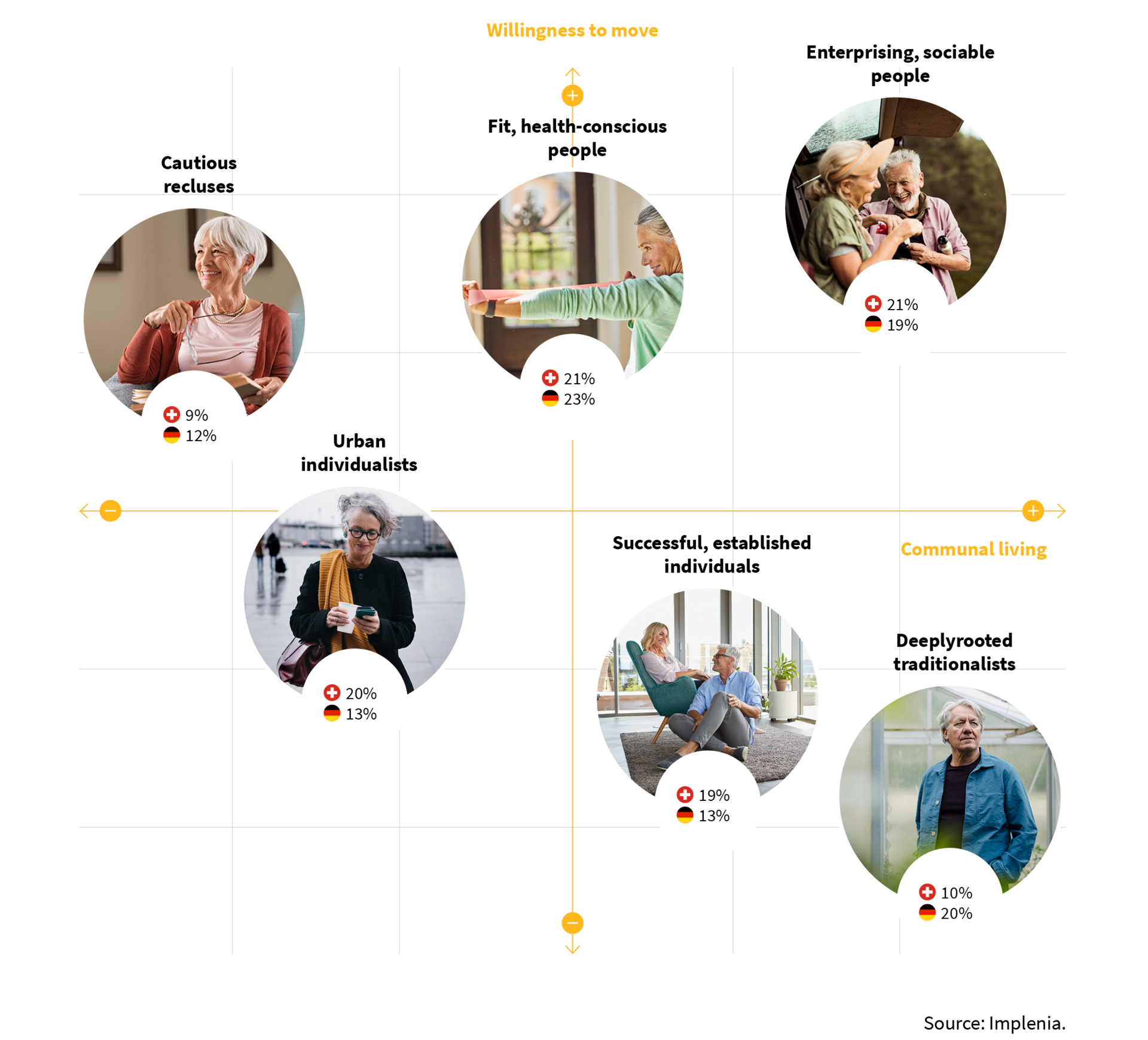
A new perspective on the needs of an ageing yet ageless society
Development of real estate products for best agers
Life is far from over when you reach your mid-fifties. Best agers are active people who make big plans and live life to the fullest. Their idea of an ideal living situation is determined less by their age and more by their lifestyle. Best agers do, however, all have one thing in common: for them, health and well-being are the keys to leading a fulfilled life. This means that quality of life is at the top their wish lists. Even when it comes to housing.
How the soon-to-be largest population group wants to live
You can find all the insights on best agers in our white paper.
We took a closer look at best agers as a group, analysing their attitudes, behaviours and requirements as they relate to their future housing situation. As a result, we were able to identify six segments within this growing population group, as well as develop a better understanding of their specific housing needs.
You can find a summary of the most important findings regarding the best agers target group in our white paper.
Philippe Kaufmann, Real Estate Product Manager, Implenia

The six lifestyles
Learn more about why not all best agers are the same and explore the six typical categories within the generation that is redefining what it means to get older.

Fit, health-conscious people
Fit, health-conscious people are always on the move and play sports to keep fit and active. They want practical, low-maintenance solutions in a place where their guests also feel comfortable. Private outdoor space is very important in this respect.
Read more
Enterprising, sociable people
Enterprising, sociable people want to feel as though they are part of the community and maintain good relationships with their neighbours. Their willingness to move home is the highest of all of the segments. They are more likely to live on their own than the average person, mostly occupying smaller, rented apartments.
Read more
Urban individualists
Compared to the other groups, urban individualists attach more importance to enjoyment, fun, hobbies and travel, as well as self-sufficiency and independence. They want the freedom to design their home according to their own unique vision. Creating a sanctuary is particularly important to them in this regard.
Read more
Successful, established individualists
Successful, established individualists have their finger on the pulse and describe themselves as modern. They are quicker to pick up on new trends than others. They are predominantly male, and their financial situation is generally secure. They possess a certain level of style and prestige and require more space.
Read more
Deeplyrooted traditionalists
Deeplyrooted traditionalists are predominantly female. Most do not work or are retired. For them, family is the most important thing in life. They prefer to be close to nature and also like to feel part of a community of neighbours.
Read more
Cautious recluses
Cautious recluses form the smallest segment in both countries. They give a lot of thought to age-appropriate housing and are more likely to live in a single-family home. Privacy and security are particularly important to them when it comes to housing.
Read moreWillingness to move home
Do best agers like moving home? Under what conditions? The following graphic shows the different best ager categories and their willingness to move as well as their interest in communal living and their size in the respective country:

The most important housing concerns
In addition to health, well-being and generally leading a fulfilled life, what else is of concern to best agers in their day-to-day lives? The key insights into their housing needs from our white paper:
Considering their housing situation and willingness to move
When it comes to future housing, desire and effective action often diverge. An attractive option that is tailored to the specific needs of a specific best ager category should be enough to persuade many undecided people to move.
Future housing
Special types of housing such as flat shares and residential homes are less popular. Preferences for renting and owning are clearly defined: only 14% of all best agers in Germany and 20% in Switzerland would consider both housing options.
Community
Best agers want to live within a positive, functional community, and seek out social contacts. In contrast, taking part in joint activities with neighbours is only important for a minority. Less than a third have a lively community with representatives from all different generations on their wish list.
Location criteria
The availability of shops, pharmacies and doctors as well as access to public transport are primary micro-location criteria for best agers.
Design preferences
Technically minimalist architectural design is not to the taste of best agers of any age. By contrast, elegant, effortlessly cosy designs are more universally appealing.
Connected living
The use of new technologies is a part of everyday life for best agers. Connected living and smart home technology, however, do not necessarily appeal to best agers unless the benefits are obvious and convincing.
Services
The potential of services lies above all at the intersection between health and safety, comfort and the simplification of day-to-day life. Such services support the independent and individual lifestyle of best agers well into old age, optimising their living experience.
You can find a host of insights into best agers in our white paper.
A fulfilled life – the most important factors
Find out for yourself what perspectives the different categories of best agers have on leading a fulfilled life – and what this means for their housing needs:
Importance for a fulfilled life in the next 5-10 years
Proportion of responses with high and very high importance or investment of time and/or money
All the insights into best agers: Would you like a summary of the most important findings on the best ager target group?
You can download the white paper here:
Who are best agers?
Generally speaking, the term “best agers” refers to a target group that is in the second half of their lives. There is no clearly defined age group, though the term usually means people from around 55 years of age and over. The majority of best agers are very active into old age and attach great importance to independence. Best agers are no longer the “seniors” as is the firm belief amongst much of society. They deal with age differently, feel much younger than their years, and are very digitally astute.
Background and primary data source for the study
Implenia is developing an innovative, scalable real estate product that focuses on the needs of an ageing society and, in particular, of best ager households in which people aged 55 and over live. The range of services offered by the real estate product should be able to adapt to the changes that occur during the course of a best ager's life. To this end, in 2022 Implenia Real Estate Products carried out a comprehensive study on the best ager target group together with its partners Milani Design & Consulting and marketmind . The survey was based on a representative sample from Germany and Switzerland.
Contact details
Philippe Kaufmann
Real Estate Product Manager
philippe.kaufmann@implenia.com
+41 58 474 09 63




